Treasury Secretary Janet Yellen warned lawmakers Tuesday that the federal government could run short of cash to pay its bills by Oct. 18 unless Congress acts quickly to increase the government’s borrowing authority.
The warning, at an appearance before the Senate Banking Committee, comes amid a standoff in Congress over the so-called debt ceiling. Senate Republicans blocked a measure to increase or suspend the debt ceiling on Monday.
Yellen said the exact date was subject to change given the unpredictability of the government’s cash flows. But she made it clear that failure to clinch a deal by mid-October would lead to the first default in U.S history, an event she has described as “catastrophic” for the economy.
“It would be disastrous for the American economy, for global financial markets, and for millions of families and workers,” Yellen told senators.
She warned that Social Security benefits, child tax credits and paychecks for the military could all be jeopardized if the federal government is unable to borrow more money.
Yellen cautioned that even flirting with a default could rattle financial markets. She recalled an earlier standoff during the Obama administration in 2011 when Congress waited until the last minute to raise the debt limit, resulting in higher borrowing costs for both the government and consumers.
“This would be a manufactured crisis we have imposed on this country,” Yellen said. “It would be a self-inflicted wound of enormous proportions.”
Sen. John Kennedy, R-La., pressed Yellen on why Democrats don’t simply raise the debt ceiling on their own, using a procedural move to sidestep the need for GOP support.
“Why don’t y’all just do it and then we don’t have this fight?” Kennedy asked. “Let’s go have a cocktail.”
Democrats pushed back, noting that more than a quarter of the federal debt that the government needs to pay was accumulated during the Trump administration.
“I wonder if Secretary Yellen takes you up on that offer to go get a cocktail if you would pay or you’d skip out on paying the bill and expect Secretary Yellen to pay,” committee Chairman Sherrod Brown, D-Ohio, asked Kennedy.
There were signs the political stalemate is making investors nervous at a time when high inflation and the continuing pandemic are already hitting markets. Stocks fell sharply Tuesday while the yield on government bonds increased.
Powell pressed on Fed’s stock trading controversy
Federal Reserve Chairman Jerome Powell, who also appeared before the committee, echoed Yellen on the importance of avoiding a government default.
Powell was also pressed about the recent revelations that two regional Federal Reserve bank presidents actively traded in securities last year, while the central bank was deeply involved in financial markets.
Dallas Fed President Robert Kaplan and Boston Fed President Eric Rosengren both announced their retirements on Monday. While both men have defended their trading as in compliance with the Fed’s ethics rules, Powell acknowledged those rules need to be tightened
“The appearance is just obviously unacceptable,” Powell said. “Our need to sustain the public’s trust is the essence of our work.”
Copyright 2021 NPR. To see more, visit https://www.npr.org.
9(MDAxODM0MDY4MDEyMTY4NDA3MzI3YjkzMw004))

9(MDAxODM0MDY4MDEyMTY4NDA3MzI3YjkzMw004))








